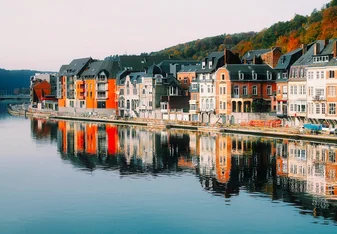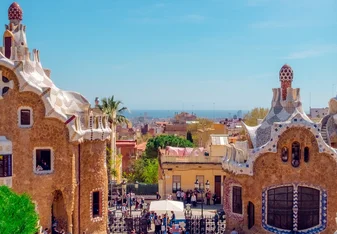Internships in the Netherlands
Internship Programs in the Netherlands
Pagination
About
In May 2011, the Netherlands was ranked as the "happiest" country according to results published by the Organization for Economic Co-operation and Development, as a result of the Netherlands’ focus on work-life balance.
Work-life balance is the Dutch concept of having a complete working life – while having a complete life outside of work, and it is emphasized greatly in the Netherlands. Also, thanks to the Dutch tradition of learning foreign languages in the Netherlands, about 70% of the total population has good knowledge of conversational English as well as a handful of other languages. Certainly in the workplace, speaking English is utilized frequently and easily by the Dutch.
Top Industries
The most popular industries in the Netherlands are shipping, fishing, trade, banking, chemicals, metallurgy, machinery, petroleum refining, electrical goods, and tourism. Some of their largest companies, and examples of those industries include Unilever, Heineken, ING, DSM, Shell, Philips, ASML, and TomTom.
- Business and Finance: Amsterdam is the financial capital of the Netherlands. All of the major Dutch banks have their headquarters there, as well as offices of other major banks such as Germany’s Deustch Bank. It is common for internships in Amsterdam to be with large banking institutions, in a variety of roles.
- Marketing/Advertising/Communications: The Dutch people are well aware of the fact that having an intern with English as a first language can be a more effective way of communicating for an international company than somebody who speaks primarily Dutch. This is why businesses in the Netherlands often hire native English speakers to perform marketing/advertising/communications type jobs – because of their ability to write copy.
- Trade: The Netherlands relies on exporting goods in order to maintain their economy. The Dutch place strong emphasis on using their central European location at becoming a hub for production, and export. In Rotterdam, you can find Europe’s largest post, an important element for the Netherlands in strategic international trade.
- Tourism: Quite obviously, the Netherlands is a popular tourist destination. In fact, Amsterdam is the 5th busiest tourist destination in Europe. Their tourism industry is always flourishing, and there are plenty of opportunities for interns from different countries to come to Netherlands and cater to people who share their native tongue.
- Electronics/IT: The Netherlands have a large IT development and electronic production business. Because they are largely an export-oriented country, they are always looking for ways to go international – and an international intern no doubt could play a role in that process.
Planning Your Trip
When and Where to Look for an Internship:
Most internship opportunities in the Netherlands are in Amsterdam, being the country’s largest city and a business hub. If you’re looking for an internship in banking, finance, media, communications, marketing, advertising, and tourism – Amsterdam is your best bet.
Rotterdam is a good city to learn about trade, due to the large port and location on the water. Other than that, smaller cities like Utrecht or Eindhoven are often home to modest IT-based companies.
Visas for Interning in the Netherlands:
In order to get a Visa for the Netherlands, the first step is to contact the Embassy of the Netherlands in your home country. The Dutch are not too strict on letting people in for short periods, but you will be required to present an airplane ticket there, and enough financial means to buy one to get back.
Some countries, such as Canada, Australia, New Zealand, and the United States may be eligible for a Working Holiday Visa. The WHV is a permit that was organized to increase ease for young people (18-30) to apply for a short-term working permit abroad.
Cost of Living in the Netherlands:
When searching for a house, a good website to visit would be www.kamernet.nl. However, as an intern you might be eligible for Duwo short stay housing, an international student residence chain. This could be a great way to save a couple Euros/month on housing.
For the most part however, living in the Netherlands is not cheap. Here are some rough figures about living costs. Note: costs reflective of Amsterdam, the most expensive city in Netherlands.
To give you a rough idea, here is your average month:
- You get about €1050 after tax
- €500 for rent
- €70-€100 on insurance (mandatory)
- €120 on food (can be a bit less depending on how expensive you buy)
- €15 for a phone plan
- €60 general bills (water, electricity, cable, etc.)
- €80/month on public transport (however typically this is reimbursed by the company providing the internship)
Work Culture in the Netherlands:
The work culture in the Netherlands is fairly modest in many ways. However, there are some important insights to note before packing up all your stuff and making your way to a new job.
- Dutch straight-forwardness is something to keep in mind. In the Netherlands, they don’t beat around the bush. If someone wants to ask you something, they will. If they don’t think you’ve done a proper job at your work, they will tell you. Remember though, this is cultural, and it usually leads to a much more effective means of communication.
- Greetings in the Netherlands are typically a handshake in the office environment, however, after getting to know a woman in Dutch society three kisses on either cheek is the norm. Every morning it is common to greet everyone you see coming in to your office with a quick “Hi!” or “Good morning!” – whether you know them personally or not.
- Meetings are a big part of Dutch business culture. They enjoy discussing a topic together and really coming to a consensus before moving on. Sometimes this can be to a lengthy process, but it also leads to better communication and understanding.
- In the Netherlands, you can certainly get away with speaking English. However, keep in mind that many Dutch people prefer to use their own language. Sometimes this means politely asking if they could speak in English so you understand, however most of the time, they will have the courtesy themselves.
Work and Labor Laws in the Netherlands:
Interning in the Netherlands can be paid or unpaid. In most circumstances, you will get a small salary that will cover your monthly costs. You also won’t have to worry about being exploited for your labor because of the Dutch focus on work-life balance.























